Yibi has a story to tell.
This is a place deep in the dense forests on the southern frontier,
A weighty read on Tea culture,
A tribute Tea garden that was once famous over 200 years ago,
The Shaping Hall, once grand and adorned with carvings and paintings,
The Anle Tea House, once thriving,
Bestowed by the imperial court with the plaque “Rui Gong Tian Chao”,
The ancient tea-horse road section in Yibi, stretching into the distance,
There are too many mysteries here,
Spurring us to explore.
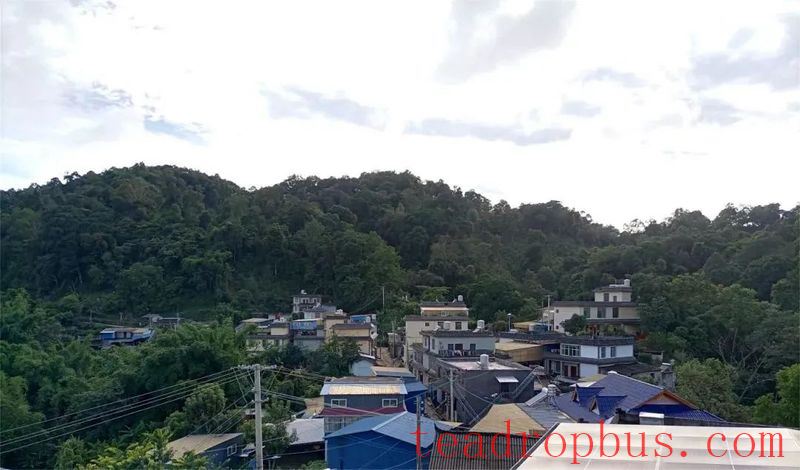
The village group of Yibi in Yiwu Town, Mengla County, is close to Yiwu Town, only 8 kilometers away, and can be reached by car very quickly. However, Yibi seems far away; it is the southernmost tea mountain in the Yiwu tea area. On the map, Yibi appears to be detached from the other tea mountains, like a jade pendant hanging around the “neck” of the Yiwu tea region.
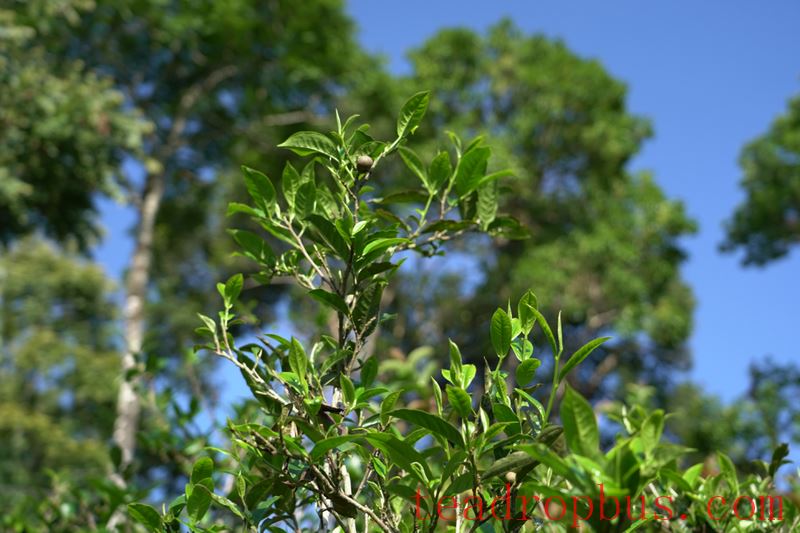
On a day after the rain cleared up, we embarked on an exploration. We walked along a small path, hoping to find more scenery. After crossing Longdong Stream and the Stone Stairs connected to Old Yiwu Street, with their magnificent views, we entered the forested territory of Yibi, where green waves undulated and stretched towards the horizon, painting beautiful landscapes of varying shades of green.
Looking out at White Tiger Mountain, towering and reaching for the clouds; gazing down at Sada River, its clear waters flowing melodically, also flowing with stories. After several treks through the forest and across streams, we saw the village group of Yibi nestled among the dense forest on a hillside, wisps of smoke floating leisurely, occasionally interrupted by the sounds of chickens and dogs—a peaceful and tranquil scene of rural life.
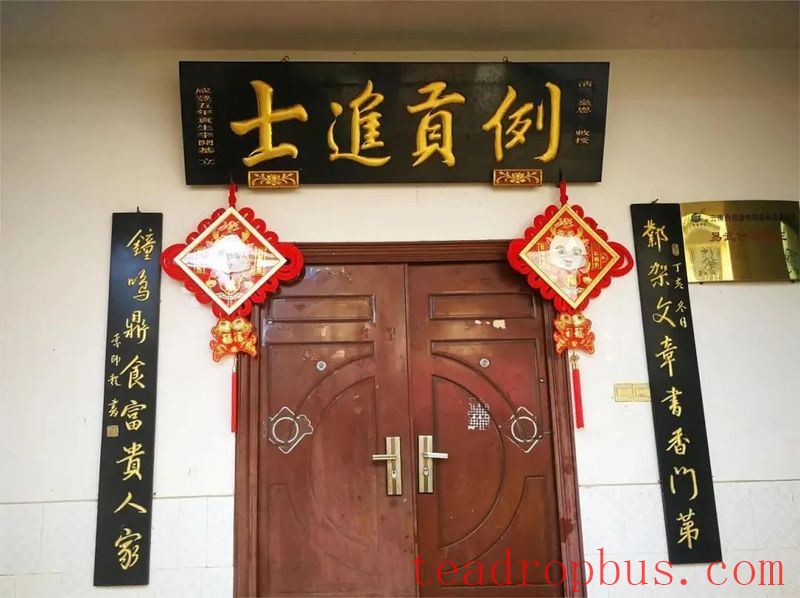
Li Yuanzhao, the head of the village group of Yibi, is simple and sincere, warmly inviting us to his home for tea. Walking into his courtyard, we noticed the prominent “Example Tribute Scholar” plaque hanging above the main entrance. Seeing our curiosity, Li Yuanzhao, a descendant of Li Kaiji, a prominent figure in the Yiwu tea industry, recounted the past glory of his ancestor: Li Kaiji was well-read since childhood and had a keen intellect. During the reign of Emperor Xianfeng of the Qing dynasty, he passed the provincial and metropolitan examinations and was selected as a tribute scholar. He then went to Beijing for the imperial examination but fell ill halfway and returned home with regret. Emperor Xianfeng was deeply moved upon hearing this and granted Li Kaiji the title of “Example Tribute Scholar” and bestowed him the rank of “Xiu Zhi Zuo Lang.”
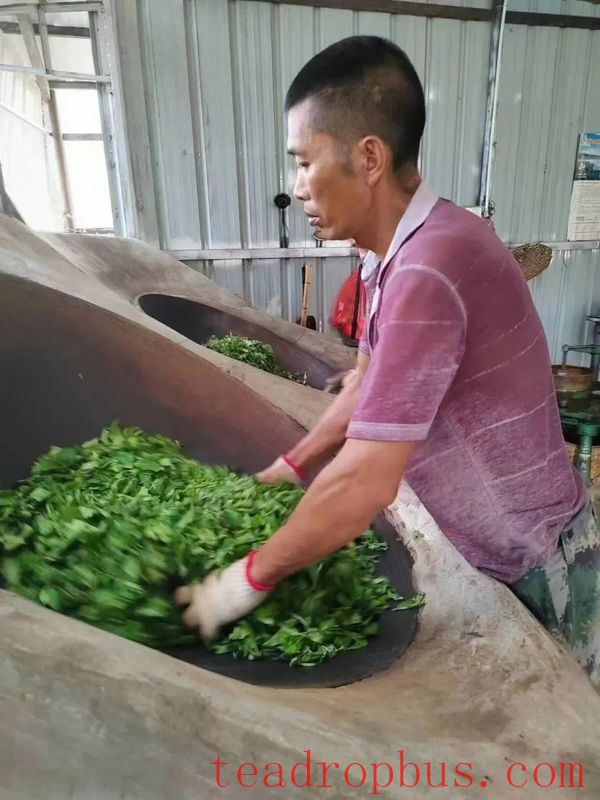
Traveling back in time, during the Jiaqing period of the Qing dynasty, Yiwu had become a major hub for tea collection and distribution in southern Yunnan, attracting numerous tea merchants. Li Zubpei (father of Li Kaiji), a merchant from Shaping, recognized the potential and moved his family to Yiwu to do business in tea. He boldly purchased a large tract of mountain forest behind Yiwu, set up camp, cleared the land for tea cultivation, and named the place “Yibi,” meaning to rival Yiwu. Later, Li's family business was passed on to Li Kaiji, who managed hundreds of acres of prime tea gardens, making it one of the important tribute tea gardens in Yiwu at the time. By then, Yibi had developed into a large village of sixty or seventy households, most of whom were tea farmers working for the Li family. The streets were paved with stone slabs, and the villagers lived harmoniously without worry about food and clothing.
During our tea break, Li Yuanzhao also recounted the glory of the Anle Tea House in those days and the honor of being bestowed the “Rui Gong Tian Chao” plaque by the imperial court.
By the Guangxu era, the tea industry experienced significant growth, and Yiwu became an important base for processing and exporting tea from the six great tea mountains. Various tea houses emerged. In 1892 (the eighteenth year of the Guangxu era), Li Kaiji founded his own tea house, named “Anle,” wishing for the prosperity and happiness of his family and the people. Li Kaiji established strict rules: integrity, authenticity, and fairness. Due to rigorous quality control in material selection and production, the tea from Anle Tea House soon won the favor of tea merchants from all over, and the business grew larger. A few years later, the annual sales volume exceeded 350 piculs (one picul approximately 75 kilograms), with more than 20 mules and horses, over 40 oxen, and over 50 workers. Even Liu Kuiguang, the owner of the renowned Tongqing Tea House, often placed orders or processed tea at Anle Tea House.
In 1894 (the twentieth year of the Guangxu era), a monumental event occurred, marking a significant chapter in the development of the Yiwu tea industry. That year, Li Kaiji carefully supervised the production of a batch of tea as an offering to the emperor. The aroma of Yibi tribute tea permeated the imperial palace, and the Sweet tea soup refreshed the heart and mind. After tasting it, Emperor Guangxu felt invigorated and ordered the Yunnan Governor to write “Rui Gong Tian Chao” to bestow upon Li Kaiji. With immense excitement, Li Kaiji carved the plaque from high-quality “water pine wood” and hung it prominently at the entrance of the Anle Tea House. Unfortunately, a fire in 1949 completely destroyed the Anle Tea House and the “Rui Gong Tian Chao” plaque, leaving only the century-old ancient tea trees swaying gently in the breeze in the high mountains, silently witnessing the long history.
Exploring the ancient tea mountain of Yibi, the scent of ancient tea wafts through the air. Historical records show that by the mid-Qing dynasty, “Within a hundred li of Yiwu, from the south in Yibi to the north in Luode, there were tea gardens on every mountain and villages everywhere. Merchants traveled continuously, and the sound of horse bells filled the mountain paths, what a bustling scene.” Although the grand Shaping Hall with its dragon and phoenix carvings has disappeared with time, traces of tea culture remain everywhere. The hall's foundation stones, the Yibi license stele, remnants of old tea houses, and the ancient tea-horse road section leading into the distance… These relics and historical sites evoke memories and a profound sense of heritage.
Wandering through this culturally rich small village, the relaxed and carefree lives of the villagers of various ethnicities come into view. The distant history and the collision with modern civilization stir emotions. Entering a neat and elegant farmhouse, the rare leisure of a tea farmer is refreshing. “Try some of our Spring Tea this year!” Li Guipeng, a new-generation tea farmer born in the 1980s, sincerely invites us. Amidst the fragrant tea aroma, Li Guipeng talks about his life in the tea industry. “Our family has about 90 mu of ancient tree tea, small trees, and arbor tea fields. In a normal year, we produce about 1,000 kilograms of tea, earning between 300,000 and 400,000 yuan annually from tea. We strictly control each step of tea picking and production to ensure quality, which has been recognized and affirmed by tea merchants.”
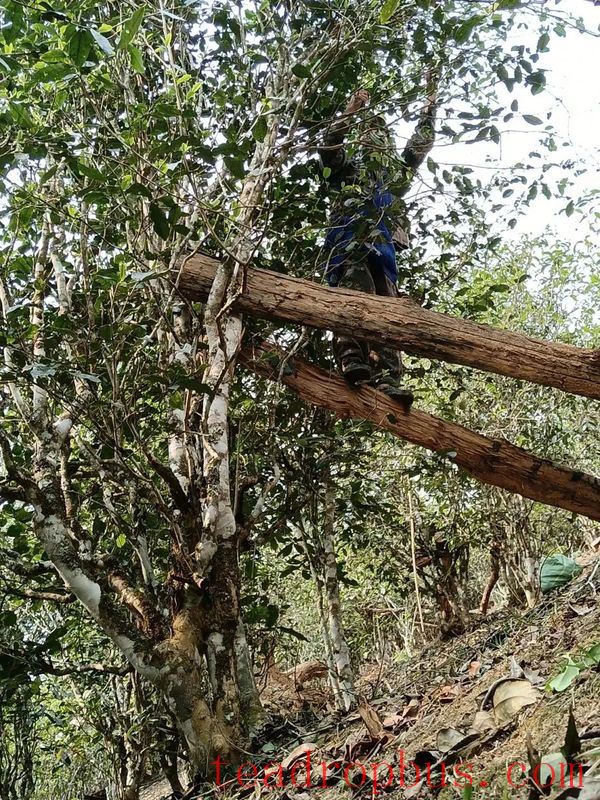
White Nenghua, the Party branch secretary of Yibi Village, who accompanied us on our visit, introduced that the villagers have inherited the precious tea resources left by their ancestors for over 200 years. Every household picks and makes